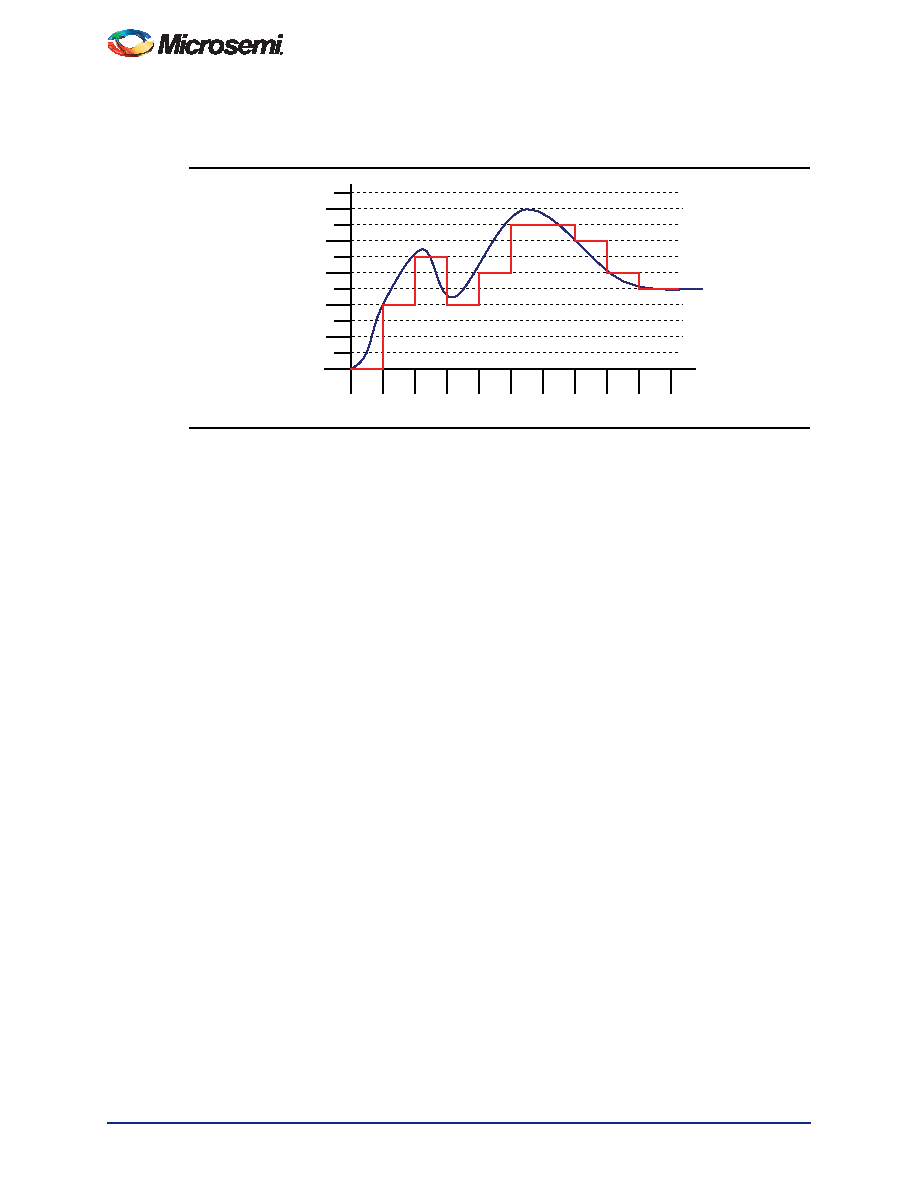- 您現(xiàn)在的位置:買賣IC網(wǎng) > PDF目錄19337 > AFS250-FGG256 (Microsemi SoC)IC FPGA FUSION 256FBGA PDF資料下載
參數(shù)資料
| 型號(hào): | AFS250-FGG256 |
| 廠商: | Microsemi SoC |
| 文件頁(yè)數(shù): | 22/334頁(yè) |
| 文件大小: | 0K |
| 描述: | IC FPGA FUSION 256FBGA |
| 特色產(chǎn)品: | Actel Fusion? Mixed-Signal FPGAs |
| 標(biāo)準(zhǔn)包裝: | 90 |
| 系列: | Fusion® |
| RAM 位總計(jì): | 36864 |
| 輸入/輸出數(shù): | 114 |
| 門數(shù): | 250000 |
| 電源電壓: | 1.425 V ~ 1.575 V |
| 安裝類型: | 表面貼裝 |
| 工作溫度: | 0°C ~ 85°C |
| 封裝/外殼: | 256-LBGA |
| 供應(yīng)商設(shè)備封裝: | 256-FPBGA(17x17) |
| 其它名稱: | 1100-1075 |
第1頁(yè)第2頁(yè)第3頁(yè)第4頁(yè)第5頁(yè)第6頁(yè)第7頁(yè)第8頁(yè)第9頁(yè)第10頁(yè)第11頁(yè)第12頁(yè)第13頁(yè)第14頁(yè)第15頁(yè)第16頁(yè)第17頁(yè)第18頁(yè)第19頁(yè)第20頁(yè)第21頁(yè)當(dāng)前第22頁(yè)第23頁(yè)第24頁(yè)第25頁(yè)第26頁(yè)第27頁(yè)第28頁(yè)第29頁(yè)第30頁(yè)第31頁(yè)第32頁(yè)第33頁(yè)第34頁(yè)第35頁(yè)第36頁(yè)第37頁(yè)第38頁(yè)第39頁(yè)第40頁(yè)第41頁(yè)第42頁(yè)第43頁(yè)第44頁(yè)第45頁(yè)第46頁(yè)第47頁(yè)第48頁(yè)第49頁(yè)第50頁(yè)第51頁(yè)第52頁(yè)第53頁(yè)第54頁(yè)第55頁(yè)第56頁(yè)第57頁(yè)第58頁(yè)第59頁(yè)第60頁(yè)第61頁(yè)第62頁(yè)第63頁(yè)第64頁(yè)第65頁(yè)第66頁(yè)第67頁(yè)第68頁(yè)第69頁(yè)第70頁(yè)第71頁(yè)第72頁(yè)第73頁(yè)第74頁(yè)第75頁(yè)第76頁(yè)第77頁(yè)第78頁(yè)第79頁(yè)第80頁(yè)第81頁(yè)第82頁(yè)第83頁(yè)第84頁(yè)第85頁(yè)第86頁(yè)第87頁(yè)第88頁(yè)第89頁(yè)第90頁(yè)第91頁(yè)第92頁(yè)第93頁(yè)第94頁(yè)第95頁(yè)第96頁(yè)第97頁(yè)第98頁(yè)第99頁(yè)第100頁(yè)第101頁(yè)第102頁(yè)第103頁(yè)第104頁(yè)第105頁(yè)第106頁(yè)第107頁(yè)第108頁(yè)第109頁(yè)第110頁(yè)第111頁(yè)第112頁(yè)第113頁(yè)第114頁(yè)第115頁(yè)第116頁(yè)第117頁(yè)第118頁(yè)第119頁(yè)第120頁(yè)第121頁(yè)第122頁(yè)第123頁(yè)第124頁(yè)第125頁(yè)第126頁(yè)第127頁(yè)第128頁(yè)第129頁(yè)第130頁(yè)第131頁(yè)第132頁(yè)第133頁(yè)第134頁(yè)第135頁(yè)第136頁(yè)第137頁(yè)第138頁(yè)第139頁(yè)第140頁(yè)第141頁(yè)第142頁(yè)第143頁(yè)第144頁(yè)第145頁(yè)第146頁(yè)第147頁(yè)第148頁(yè)第149頁(yè)第150頁(yè)第151頁(yè)第152頁(yè)第153頁(yè)第154頁(yè)第155頁(yè)第156頁(yè)第157頁(yè)第158頁(yè)第159頁(yè)第160頁(yè)第161頁(yè)第162頁(yè)第163頁(yè)第164頁(yè)第165頁(yè)第166頁(yè)第167頁(yè)第168頁(yè)第169頁(yè)第170頁(yè)第171頁(yè)第172頁(yè)第173頁(yè)第174頁(yè)第175頁(yè)第176頁(yè)第177頁(yè)第178頁(yè)第179頁(yè)第180頁(yè)第181頁(yè)第182頁(yè)第183頁(yè)第184頁(yè)第185頁(yè)第186頁(yè)第187頁(yè)第188頁(yè)第189頁(yè)第190頁(yè)第191頁(yè)第192頁(yè)第193頁(yè)第194頁(yè)第195頁(yè)第196頁(yè)第197頁(yè)第198頁(yè)第199頁(yè)第200頁(yè)第201頁(yè)第202頁(yè)第203頁(yè)第204頁(yè)第205頁(yè)第206頁(yè)第207頁(yè)第208頁(yè)第209頁(yè)第210頁(yè)第211頁(yè)第212頁(yè)第213頁(yè)第214頁(yè)第215頁(yè)第216頁(yè)第217頁(yè)第218頁(yè)第219頁(yè)第220頁(yè)第221頁(yè)第222頁(yè)第223頁(yè)第224頁(yè)第225頁(yè)第226頁(yè)第227頁(yè)第228頁(yè)第229頁(yè)第230頁(yè)第231頁(yè)第232頁(yè)第233頁(yè)第234頁(yè)第235頁(yè)第236頁(yè)第237頁(yè)第238頁(yè)第239頁(yè)第240頁(yè)第241頁(yè)第242頁(yè)第243頁(yè)第244頁(yè)第245頁(yè)第246頁(yè)第247頁(yè)第248頁(yè)第249頁(yè)第250頁(yè)第251頁(yè)第252頁(yè)第253頁(yè)第254頁(yè)第255頁(yè)第256頁(yè)第257頁(yè)第258頁(yè)第259頁(yè)第260頁(yè)第261頁(yè)第262頁(yè)第263頁(yè)第264頁(yè)第265頁(yè)第266頁(yè)第267頁(yè)第268頁(yè)第269頁(yè)第270頁(yè)第271頁(yè)第272頁(yè)第273頁(yè)第274頁(yè)第275頁(yè)第276頁(yè)第277頁(yè)第278頁(yè)第279頁(yè)第280頁(yè)第281頁(yè)第282頁(yè)第283頁(yè)第284頁(yè)第285頁(yè)第286頁(yè)第287頁(yè)第288頁(yè)第289頁(yè)第290頁(yè)第291頁(yè)第292頁(yè)第293頁(yè)第294頁(yè)第295頁(yè)第296頁(yè)第297頁(yè)第298頁(yè)第299頁(yè)第300頁(yè)第301頁(yè)第302頁(yè)第303頁(yè)第304頁(yè)第305頁(yè)第306頁(yè)第307頁(yè)第308頁(yè)第309頁(yè)第310頁(yè)第311頁(yè)第312頁(yè)第313頁(yè)第314頁(yè)第315頁(yè)第316頁(yè)第317頁(yè)第318頁(yè)第319頁(yè)第320頁(yè)第321頁(yè)第322頁(yè)第323頁(yè)第324頁(yè)第325頁(yè)第326頁(yè)第327頁(yè)第328頁(yè)第329頁(yè)第330頁(yè)第331頁(yè)第332頁(yè)第333頁(yè)第334頁(yè)

Device Architecture
2-102
Revision 4
This process results in a binary approximation of VIN. Generally, there is a fixed interval T, the sampling
period, between the samples. The inverse of the sampling period is often referred to as the sampling
Figure 2-82 demonstrates that if the signal changes faster than the sampling rate can accommodate, or if
the actual value of VIN falls between counts in the result, this information is lost during the conversion.
There are several techniques that can be used to address these issues.
First, the sampling rate must be chosen to provide enough samples to adequately represent the input
signal. Based on the Nyquist-Shannon Sampling Theorem, the minimum sampling rate must be at least
twice the frequency of the highest frequency component in the target signal (Nyquist Frequency). For
example, to recreate the frequency content of an audio signal with up to 22 KHz bandwidth, the user
must sample it at a minimum of 44 ksps. However, as shown in Figure 2-82, significant post-processing
of the data is required to interpolate the value of the waveform during the time between each sample.
Similarly, to re-create the amplitude variation of a signal, the signal must be sampled with adequate
resolution. Continuing with the audio example, the dynamic range of the human ear (the ratio of the
amplitude of the threshold of hearing to the threshold of pain) is generally accepted to be 135 dB, and the
dynamic range of a typical symphony orchestra performance is around 85 dB. Most commercial
recording media provide about 96 dB of dynamic range using 16-bit sample resolution. But 16-bit fidelity
does not necessarily mean that you need a 16-bit ADC. As long as the input is sampled at or above the
Nyquist Frequency, post-processing techniques can be used to interpolate intermediate values and
reconstruct the original input signal to within desired tolerances.
If sophisticated digital signal processing (DSP) capabilities are available, the best results are obtained by
implementing a reconstruction filter, which is used to interpolate many intermediate values with higher
resolution than the original data. Interpolating many intermediate values increases the effective number
of samples, and higher resolution increases the effective number of bits in the sample. In many cases,
however, it is not cost-effective or necessary to implement such a sophisticated reconstruction algorithm.
For applications that do not require extremely fine reproduction of the input signal, alternative methods
can enhance digital sampling results with relatively simple post-processing. The details of such
techniques are out of the scope of this chapter; refer to the Improving ADC Results through
Oversampling and Post-Processing of Data white paper for more information.
Figure 2-82 Conversion Example
T
LSB
相關(guān)PDF資料 |
PDF描述 |
|---|---|
| LT1768IGN#TRPBF | IC CTRLR CCFL SGL/MULT HP 16SSOP |
| TPSD157M016R0150 | CAP TANT 150UF 16V 20% 2917 |
| EEM28DSES | CONN EDGECARD 56POS .156 EYELET |
| BAS19LT1G | DIODE SWITCH 200MA 120V SOT23 |
| RAC05-24SA-ST | CONV AC/DC 90-264VAC 24V 200MA |
相關(guān)代理商/技術(shù)參數(shù) |
參數(shù)描述 |
|---|---|
| AFS250-FGG256ES | 制造商:ACTEL 制造商全稱:Actel Corporation 功能描述:Actel Fusion Mixed-Signal FPGAs |
| AFS250-FGG256I | 功能描述:IC FPGA 2MB FLASH 250K 256FBGA RoHS:是 類別:集成電路 (IC) >> 嵌入式 - FPGA(現(xiàn)場(chǎng)可編程門陣列) 系列:Fusion® 標(biāo)準(zhǔn)包裝:40 系列:SX-A LAB/CLB數(shù):6036 邏輯元件/單元數(shù):- RAM 位總計(jì):- 輸入/輸出數(shù):360 門數(shù):108000 電源電壓:2.25 V ~ 5.25 V 安裝類型:表面貼裝 工作溫度:0°C ~ 70°C 封裝/外殼:484-BGA 供應(yīng)商設(shè)備封裝:484-FPBGA(27X27) |
| AFS250-FGG256IX297 | 制造商:Microsemi Corporation 功能描述:FUSION 250K GATES IND CMOS 3.3V 256 FBGA - Trays |
| AFS250-FGG256PP | 制造商:ACTEL 制造商全稱:Actel Corporation 功能描述:Actel Fusion Mixed-Signal FPGAs |
| AFS250-FPQ208 | 制造商:Microsemi Corporation 功能描述:FPGA FUSION 250K GATES 130NM 1.5V 208PQFP - Trays 制造商:Microsemi SOC Products Group 功能描述:FPGA FUSION 250K GATES 130NM 1.5V 208PQFP - Trays |
發(fā)布緊急采購(gòu),3分鐘左右您將得到回復(fù)。